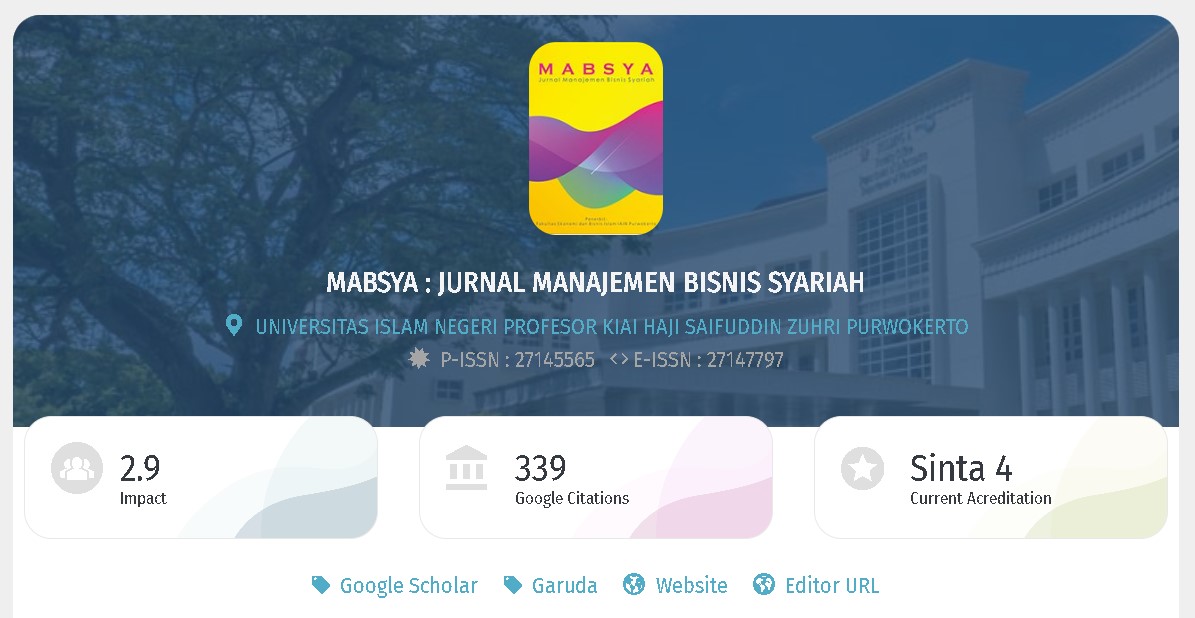Model Pengembangan Zakat Produktif di Masjid Jami’ Al-Baitul Amien Jember sebagai Pemberdayaan Ekonomi Umat
DOI:
https://doi.org/10.24090/mabsya.v1i2.3458Keywords:
Model, Zakat Produktif, MasjidAbstract
This research focuses on models, concepts, practices and the role of the Mosque-Based Economy in the perspective of Islamic economics in the Masjid Jamik Al Baitul Amien in improving Community Welfare. The purpose of this study is to describe the models, concepts, practices and roles of mosque-based economics in the perspective of Islamic economics in the Masjid Al-Baitul Amin Jember. This research method uses a qualitative approach with a descriptive type, this is because researchers want to describe the Model of Mosque-Based Economic Development in the Islamic Economic Perspective at the Jamik Al-Baitul Amien Mosque in Jember Regency 2015. The results of the study show that the economic economic model of the Ummah uses financing or the provision of facilities by providing funds in accordance with sharia principles. To support investments that have been planned based on an agreement between the institution and other parties, financed by the concept of optimizing productive Zakat or better known as micro business loans without interest that can burden small communities, so that people can meet their economic needs. Then the capabilities possessed by the Jami Mosque 'Al-Baitul Amin Jember are professional human resources, strategic location, adequate infrastructure and sufficient facilities for the economic empowerment of the Ummah.References
Adiwarman Azwar, Karim. 2008. Sejarah Pemikiran Ekonomi Islami (Jakarta, Rajawali Grafindo.
Amiruddin, Teuku. Supardi. 2001. Manajemen Masjid dalam Pembangunan Masyarakat, Optimalisasi Peran dan Fungsi Masjid. Yogyakarta: UII Press.
Fakhruddin. 2008. Fiqih dan Manajemen Zakat di Indonesia. Malang: UIN-Malang Press.
Handryant, Nur Aisyah. 2010. Masjid Sebagai Pusat Pengembangan Masyarakat, Integrasi Konsep Habluminallah, Habluminannas dan Habluminal’alam. Malang: UIN Malik Press.
Muhammad. 2004. ekonomi mikro dalam perspektif islam BPFE-Yogyakarta.
Mufraini, Arif. 2018. Akuntansi dan Manajemen Zakat, Mengomunikasikan Kesadaran dan Membangun Jaringan. Jakarta: Prenada Media Grup.
Nurhadi, Ismail. Ekisopini.blogspot.com,pemberdayaan-ekonomi-umat-melalui.htm (dikutip tgl 23 maret 2015
Sahri, Muhammad.http://prosinet.com/bisnis/ekonomi-syariah/1415-ekonomi-berbais-mesjid.htm(dikutip tgl 23 maret 2015)
Hidayat, Rahmat. Studi Agama Vol. XVII, no. 1 (2017), pp. 63-84, Penerapam Manajemen Zakat Produktif dalam Meningkatkan Ekonomi Umat di PKPU (Pos Keadilan Peduli Umat) Kota Makassar.
Arikunto, Suharsimi. 2010. Prosedur Penelitian (Suatu Pendekatan Praktik), Ed. Rev., cet. 14 Jakarta: Rineka Cipta.
Wibisono, Yusuf. 2014. Mengelola Zakat Indonesia Diskursus Pengelolaan Zakat Nasional. Jakarta: Prenada Media Grup.
Pratama, Yoghi Citra. Jurnal of Tauhidinomics Vol. 1 No. 1 (2015): 93-104 Peran Zakat Dalam Penanggulangan Kemiskinan (Studi Kasus Program Zakat Produktif Pada badan Amil Zakat basional)
Amiruddin, Teuku. Supardi. 2001. Manajemen Masjid dalam Pembangunan Masyarakat, Optimalisasi Peran dan Fungsi Masjid. Yogyakarta: UII Press.
Fakhruddin. 2008. Fiqih dan Manajemen Zakat di Indonesia. Malang: UIN-Malang Press.
Handryant, Nur Aisyah. 2010. Masjid Sebagai Pusat Pengembangan Masyarakat, Integrasi Konsep Habluminallah, Habluminannas dan Habluminal’alam. Malang: UIN Malik Press.
Muhammad. 2004. ekonomi mikro dalam perspektif islam BPFE-Yogyakarta.
Mufraini, Arif. 2018. Akuntansi dan Manajemen Zakat, Mengomunikasikan Kesadaran dan Membangun Jaringan. Jakarta: Prenada Media Grup.
Nurhadi, Ismail. Ekisopini.blogspot.com,pemberdayaan-ekonomi-umat-melalui.htm (dikutip tgl 23 maret 2015
Sahri, Muhammad.http://prosinet.com/bisnis/ekonomi-syariah/1415-ekonomi-berbais-mesjid.htm(dikutip tgl 23 maret 2015)
Hidayat, Rahmat. Studi Agama Vol. XVII, no. 1 (2017), pp. 63-84, Penerapam Manajemen Zakat Produktif dalam Meningkatkan Ekonomi Umat di PKPU (Pos Keadilan Peduli Umat) Kota Makassar.
Arikunto, Suharsimi. 2010. Prosedur Penelitian (Suatu Pendekatan Praktik), Ed. Rev., cet. 14 Jakarta: Rineka Cipta.
Wibisono, Yusuf. 2014. Mengelola Zakat Indonesia Diskursus Pengelolaan Zakat Nasional. Jakarta: Prenada Media Grup.
Pratama, Yoghi Citra. Jurnal of Tauhidinomics Vol. 1 No. 1 (2015): 93-104 Peran Zakat Dalam Penanggulangan Kemiskinan (Studi Kasus Program Zakat Produktif Pada badan Amil Zakat basional)
Downloads
Published
2019-12-26
How to Cite
Supandi, A. F. (2019). Model Pengembangan Zakat Produktif di Masjid Jami’ Al-Baitul Amien Jember sebagai Pemberdayaan Ekonomi Umat. Mabsya: Jurnal Manajemen Bisnis Syariah, 1(2), 113–130. https://doi.org/10.24090/mabsya.v1i2.3458
Issue
Section
Articles
License
Authors who publish with this journal agree to the following terms: Authors retain copyright and grant the journal right of first publication with the work simultaneously licensed under a Creative Commons Attribution 4.0 International License that allows others to share the work with an acknowledgment of the work's authorship and initial publication in this journal.

















